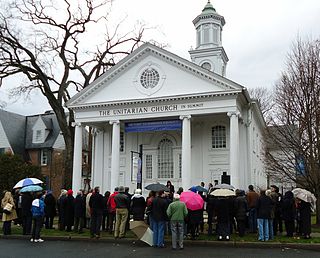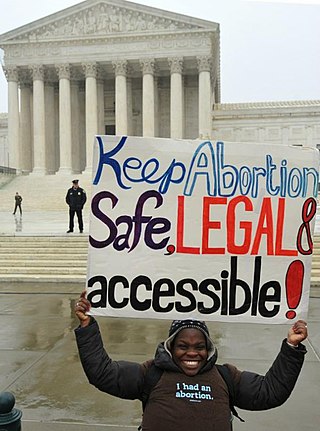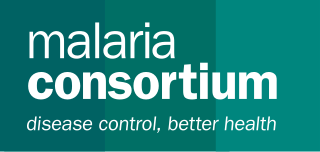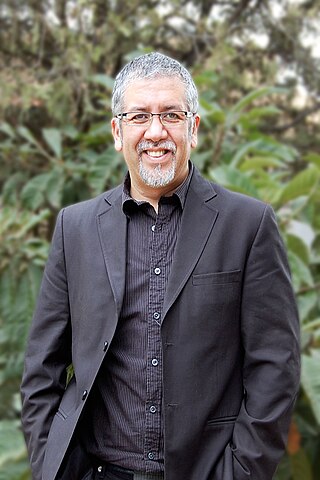Center for Democracy & Technology (CDT) is a Washington, D.C.–based 501(c)(3) nonprofit organisation that advocates for digital rights and freedom of expression. CDT seeks to promote legislation that enables individuals to use the internet for purposes of well-intent, while at the same time reducing its potential for harm. It advocates for transparency, accountability, and limiting the collection of personal information.
Self-advocacy is the act of speaking up for oneself and one's interests. It is used as a name for civil rights movements and mutual aid networks for people with intellectual and developmental disabilities. The term arose in the broader civil rights movements of the 1960s and 1970s, and is part of the disability rights movement. Today there are self-advocacy organizations across the world.

Humanity & Inclusion is an international non-governmental organization. It was founded in 1982 to provide help in refugee camps in Cambodia and Thailand. Headquartered in France and Belgium, since its creation, it has opened branches in six other countries: Switzerland, Luxembourg, United Kingdom, Germany, Canada and the United States.

Unitarian Universalism, as practiced by the Unitarian Universalist Association (UUA), and the Canadian Unitarian Council (CUC), is a non-Creedal and Liberal theological tradition and an LGBTQ affirming denomination.
The People's Recovery Empowerment Development Assistance Foundation, commonly referred to as the PREDA Foundation or PREDA, is a charitable organization that was founded in Olongapo City, Philippines in 1974. Its purposes include the promotion and protection of the dignity and the Human Rights of the Filipino people, especially of women and children. The main focus is to assist the sexually-exploited and abused children.
The fathers' rights movement has simultaneously evolved in many countries, advocating for shared parenting after divorce or separation, and the right of children and fathers to have close and meaningful relationships. This article provides details about the fathers' rights movement in specific countries.
Scholars at Risk (SAR) is a United States–based international network of academic institutions organized to support and defend the principles of academic freedom and to defend the human rights of scholars around the world. Network membership includes over 530 higher educational institutions in 42 countries.

Reproductive justice is a critical feminist framework that was invented as a response to United States reproductive politics. The three core values of reproductive justice are the right to have a child, the right to not have a child, and the right to parent a child or children in safe and healthy environments. The framework moves women's reproductive rights past a legal and political debate to incorporate the economic, social, and health factors that impact women's reproductive choices and decision-making ability.

The Center for Women's Global Leadership, based at Rutgers University, was founded in 1989 by Charlotte Bunch, the former executive director and an internationally renowned activist for women's human rights. Executive Director Krishanti Dharmaraj is also the founder of the Dignity Index and co-founder of WILD for Human Rights and the Sri Lanka Children's Fund. The former executive director, Radhika Balakrishnan, is now the faculty director, and a professor in the Department of Women's and Gender Studies at Rutgers, chair of the Board of the US Human Rights Network, and a board member of the Center for Constitutional Rights. Located on Douglass Residential College at Rutgers University, CWGL is a unit of International Programs within the School of Arts and Sciences and is a member of the Institute for Women's Leadership, a consortium of women's programs at Rutgers.
The Autistic Self Advocacy Network (ASAN) is an American 501(c)(3) nonprofit advocacy organization run by and for individuals on the autism spectrum. ASAN advocates for the inclusion of autistic people in decisions that affect them, including: legislation, depiction in the media, and disability services.
UNICEF, originally the United Nations International Children's Emergency Fund, officially United Nations Children's Fund since 1953, is an agency of the United Nations responsible for providing humanitarian and developmental aid to children worldwide. The organization is one of the most widely known and visible social welfare entities globally, operating in 192 countries and territories. UNICEF's activities include providing immunizations and disease prevention, administering treatment for children and mothers with HIV, enhancing childhood and maternal nutrition, improving sanitation, promoting education, and providing emergency relief in response to disasters.
The Global Health Council is a United States–based non-profit networking organization "supporting and connecting advocates, implementers and stakeholders around global health priorities worldwide". The Council is the world's largest membership alliance dedicated to advancing policies and programs that improve health around the world. The Council serves and represents thousands of public health professionals from over 150 countries. They work "to improve health globally through increased investment, robust policies and the power of the collective voice.": According to their website the Council "convenes stakeholders around key global health priorities and actively engages key decision makers to influence health policy."

Malaria Consortium is an international non-profit organization based in Cambridge Heath, London, specializing in the comprehensive control of malaria and other communicable diseases – particularly those affecting children under five.
The Organization for Respect and Care for Animals, or ORCA, is a civil society organization that helps people care for nature and animal welfare in order to achieve personal, economic and social development. The group aims to fulfill their mission in Serbia and the Western Balkans through advocacy, research, and education, as well as by monitoring policies and regulations. The purpose of ORCA's advocacy is to effect the enforcement and adoption of better policies and to improve society's attitude towards nature and animals.

ECPAT is a global network of civil society organisations that works to end the sexual exploitation of children. It focuses on ending the online sexual exploitation of children, the trafficking of children for sexual purposes, the sexual exploitation of children in prostitution, child, early and forced marriages, and the sexual exploitation of children in the travel and tourism industry.

Dr Patricio Cuevas-Parra is a children's rights advocate who manages research and information analysis on social justice issues affecting children and young people. He has published a variety of books and reports on the topics of children's rights, child participation, indigenous children and gender equality. He holds a PhD in Social Policy from the University of Edinburgh, United Kingdom, a Master of Advanced Studies in Children’s Rights from University of Fribourg-UIKB, Switzerland, and a Master of International Relations.
A children's ombudsman, children's commissioner, youth commissioner, child advocate, children's commission, youth ombudsman or equivalent body is a public authority in various countries charged with the protection and promotion of the rights of children and young people, either in society at large, or in specific categories such as children in contact with the care system. The agencies usually have a substantial degree of independence from the executive, the term is often used differently from the original meaning of ombudsman, it is often an umbrella term, often used as a translation convention or national human rights institutions, dealing with individual complaints, intervening with other public authorities, conducting research, and – where their mandate permits them to engage in advocacy – generally promoting children's rights in public policy, law and practice. The first children's commissioner was established in Norway in 1981. The creation of such institutions has been promoted by the United Nations Committee on the Rights of the Child, and, from 1990 onwards, by the Council of Europe.
The National Agency for the Prohibition of Trafficking in Persons (NAPTIP) is a law enforcement agency of the federal government of Nigeria. It was established in July, 2003 to combat human trafficking and other similar human rights violations.
Morénike Giwa Onaiwu is an American educator, author, and autism and HIV advocate. Alongside E. Ashkenazy and Lydia Brown, Onaiwu is an editor of All the Weight of Our Dreams, an anthology of art and writing entirely by autistic people of color published by the Autism Women's Network in June 2017.






